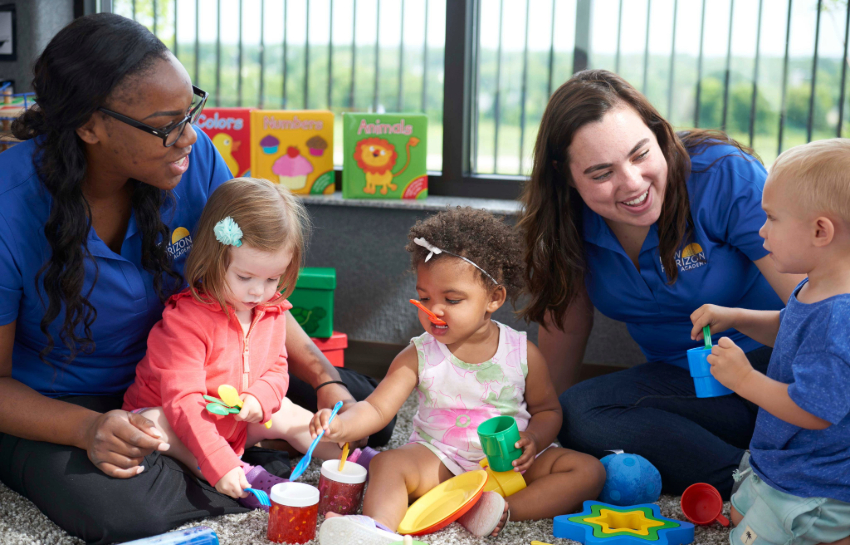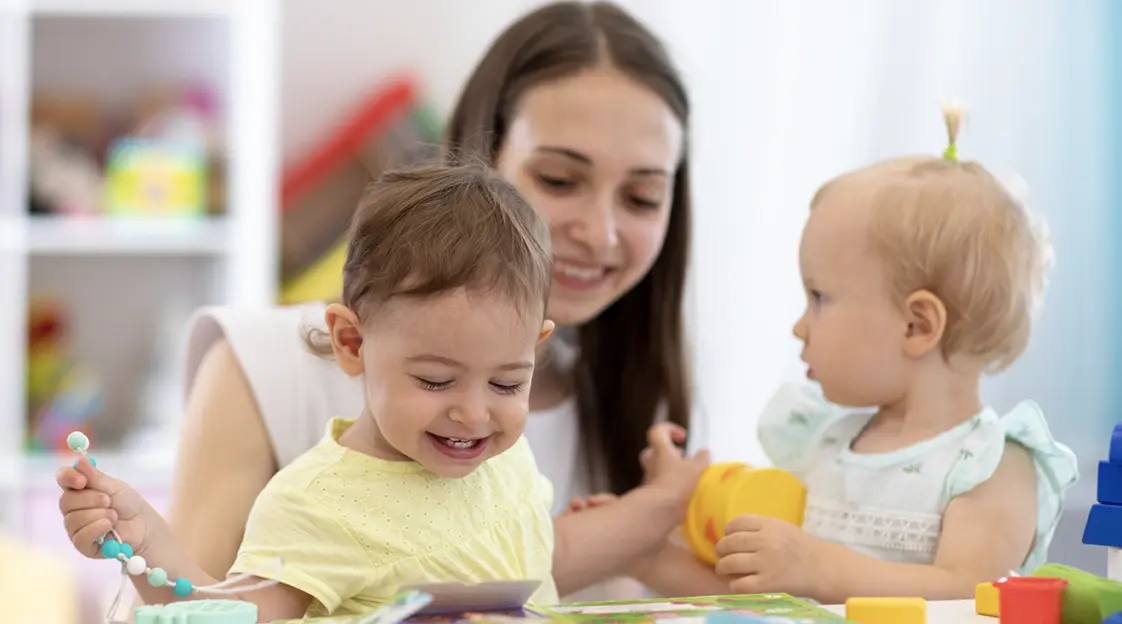Find Top-Rated Daycare Near Me for Infants: Your Guide to Quality Treatment
Find Top-Rated Daycare Near Me for Infants: Your Guide to Quality Treatment
Blog Article
The Duty of Daycare in Fostering Your Young child's Psychological and Cognitive Abilities With Organized Play and Educational Activities
The role of daycare in supporting a toddler's cognitive and emotional growth is usually underestimated, yet it serves as an essential environment for organized play and academic tasks. With thoroughly created experiences and interactions, caretakers assist in necessary abilities such as psychological recognition and analytical. These foundational components not just boost a youngster's ability to link with peers but likewise foster strength and flexibility in various circumstances. Understanding the subtleties of exactly how these characteristics unfold raises important inquiries regarding the long-lasting effect of very early childcare experiences on individual growth and social combination. What might that mean for future growth?
Significance of Organized Play
Structured play is a vital element of young child development, as it offers a structure where youngsters can involve in meaningful interactions and discovering experiences. This sort of play is deliberately made to promote different developmental skills, such as cognitive, social, and physical capacities. By joining organized activities, kids find out to comply with regulations, take turns, and coordinate with peers, all of which are vital for their interpersonal abilities.

Additionally, structured play often incorporates instructional aspects, such as counting, shade recognition, and language advancement, seamlessly incorporating discovering into fun tasks. This technique not just catches toddlers' interest however additionally strengthens essential principles in a pleasurable manner. Overall, structured play is crucial in promoting a balanced growth, gearing up young children with the foundational skills required for future knowing and social communications.
Emotional Advancement in Childcare
Childcare environments play an important role in promoting psychological growth in kids. These settings offer youngsters with opportunities to interact with caretakers and peers, helping with the advancement of essential social-emotional skills. Through regular interactions, young children discover to recognize and reveal their emotions, such as happiness, frustration, or sadness, which is vital for their emotional maturity.

In addition, the structured environment of day care enables kids to experience a range of emotions in a risk-free area. When transitioning from home to childcare and create durability as they browse new partnerships and experiences, they find out to handle feelings of separation stress and anxiety. In general, the psychological growth fostered in childcare not only benefits toddlers during their developmental years but additionally lays the foundation for healthy and balanced social partnerships and psychological health throughout their lives.
Cognitive Skills Via Activities
Through participating in a range of activities, toddlers in daycare settings can considerably improve their cognitive abilities. Structured play and educational tasks are crucial in advertising cognitive advancement, as they give opportunities for expedition, problem-solving, and critical thinking. Activities such as challenges, structure blocks, and memory video games challenge kids to believe creatively and realistically, promoting vital skills like spatial understanding and pattern acknowledgment.
In addition, interactive storytime sessions urge language growth and comprehension. By listening to stories, kids learn to process details and involve their creativities, which improves their narrative skills and vocabulary. Furthermore, hands-on tasks including crafts and arts stimulate fine motor abilities while likewise encouraging self-expression and imagination.
Sensory play, you could try here such as sand or water tasks, permits young children to trying out different appearances and materials, advertising baby daycare near me inquiry-based learning. These experiences not just boost cognitive abilities but also impart a sense of curiosity about the world around them - baby daycare near me. In general, the varied series of cognitive activities provided in childcare settings plays a critical role in forming a toddler's capability to think seriously, solve troubles, and engage meaningfully with their environments
Social Links and Interaction
In a caring environment, kids normally forge social connections and participate in communications that are crucial for their interpersonal and psychological growth. Childcare setups provide an one-of-a-kind possibility for children to interact with peers, fostering necessary social abilities such as sharing, teamwork, and conflict resolution. These interactions assist young children find out to navigate their feelings and comprehend the point of views of others, which are essential parts of emotional intelligence.
With structured play and team activities, young children are urged to interact their ideas and sensations, boosting their spoken abilities and promoting empathy. Engaging with peers also presents them to varied social norms and actions, improving their understanding of social characteristics. Furthermore, consistent interaction with other children assists to build a feeling of area, offering a support group that is valuable see this page for emotional development.
As kids take part in collective tasks, they learn the importance of teamwork, settlement, and persistence. These fundamental social abilities are essential as they plan for future connections, both in academic settings and beyond. Eventually, the social links developed in day care play a significant duty in shaping a young child's ability to connect favorably and properly with others throughout their lives.
Function of Caregivers in Development

Caretakers play a critical function in promoting toddler growth, particularly in the context of the social communications they experience in childcare setups. These professionals provide a nurturing atmosphere where toddlers can discover their feelings and cognitive capacities through structured play and academic activities. By taking part in purposeful conversations, caregivers sustain language growth and improve social abilities.
Moreover, caretakers design appropriate habits and psychological feedbacks, assisting young children learn empathy and dispute resolution. Their visibility likewise creates a complacency, which is essential for children to confidently explore their environments and involve with peers.
In enhancement to emotional and social assistance, caregivers contribute in implementing educational curricula that promote cognitive growth - baby daycare near me. They introduce age-appropriate activities that promote curiosity, critical reasoning, and analytical skills. This organized approach makes sure that toddlers not just appreciate their play however also get fundamental understanding necessary for future understanding
Ultimately, the quality of caretaker communications significantly influences a kid's total development. By cultivating a interesting and supportive environment, caretakers assist lay the groundwork for healthy and balanced psychological and cognitive growth, gearing up youngsters with vital abilities for their lifelong trip.
Final Thought
In verdict, childcare serves as an important environment for fostering cognitive and emotional growth in young children. Via structured play and , youngsters experience substantial development in their ability to recognize and reveal feelings, establish essential believing skills, and type important social links. The function of caretakers contributes in promoting these experiences, guaranteeing that each kid take advantage of a nurturing ambience that promotes long-lasting psychological well-being and cognitive innovation.
The role of day care in supporting a young child's emotional and cognitive growth is commonly ignored, yet it offers as a pivotal environment for structured play and educational tasks. Overall, structured play is crucial in promoting a well balanced advancement, equipping kids with the foundational abilities essential for future knowing and social communications.
Day care environments play a critical function in cultivating emotional advancement in kids. Generally, the emotional growth fostered in childcare not only benefits young children during their developmental years yet also lays the foundation for healthy interpersonal relationships and psychological wellness throughout their lives.
With structured play and team activities, toddlers are encouraged to connect their thoughts and feelings, improving their spoken abilities and advertising compassion.
Report this page